CLAS 357
Bacchanalia (slavery & freedom in religion)
April 15, 2024
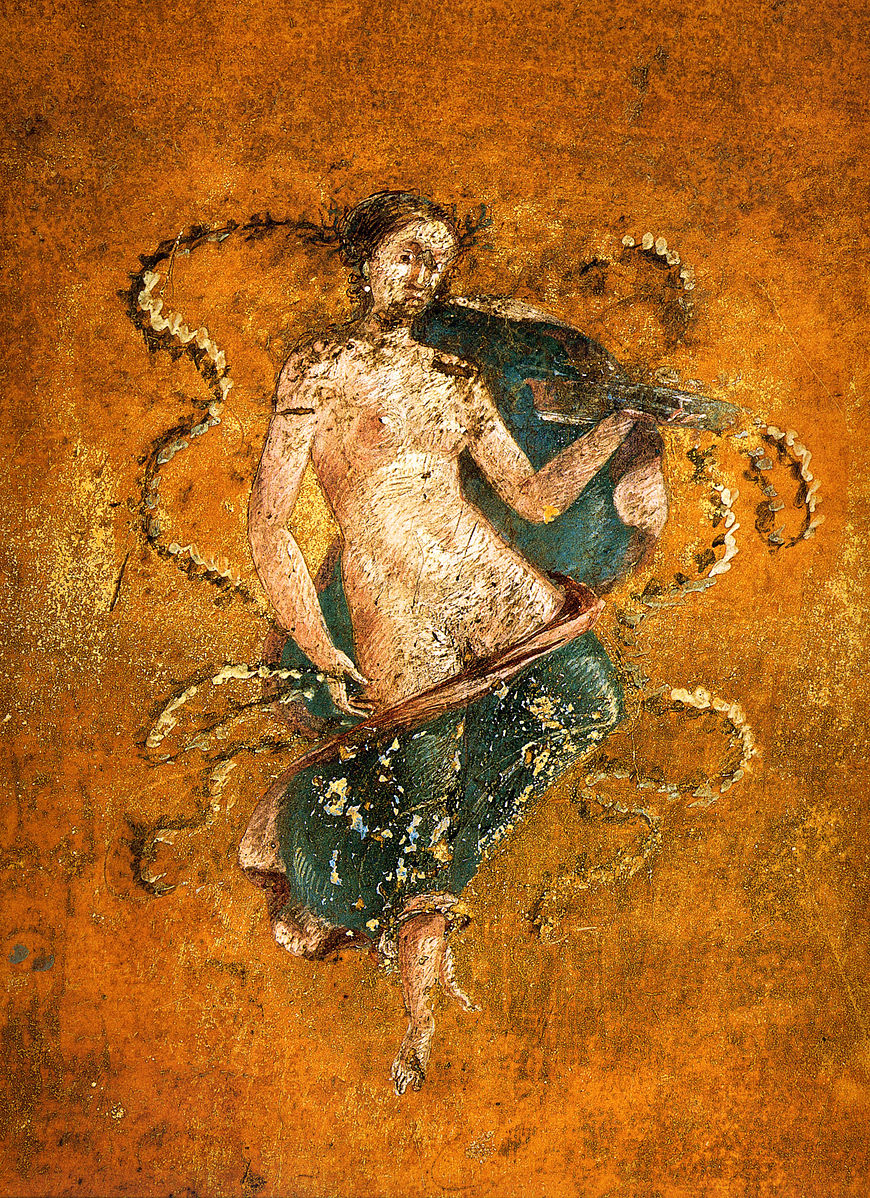
Floating Maenad with offering (Casa del Centenario, Pompeii)
The Bacchanalia in Rome & Italy (186 BCE)
- Roman (elite) state religion: polytheism, orthopraxy, augury, contractual exchange (do ut des), inclusiveness
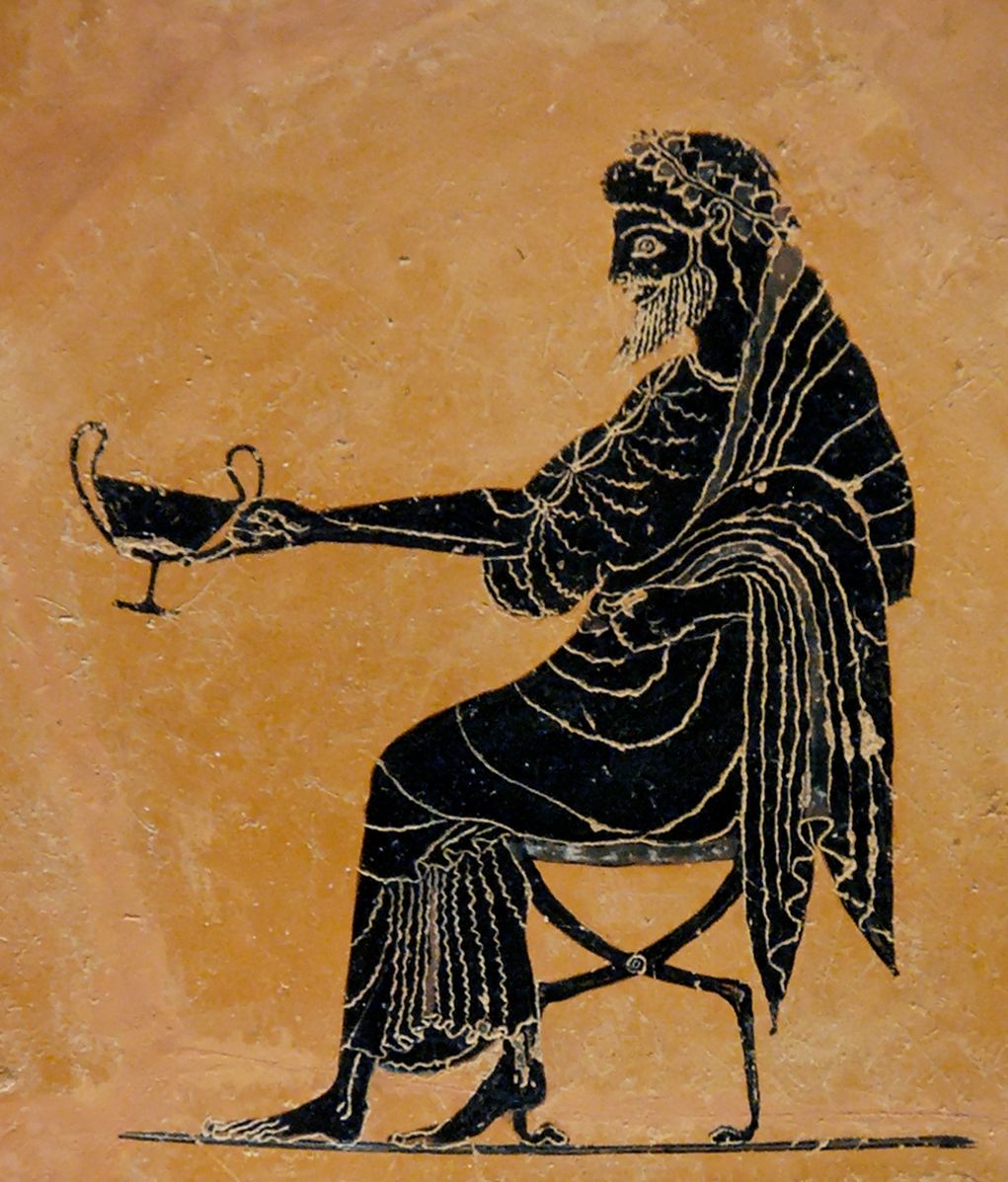
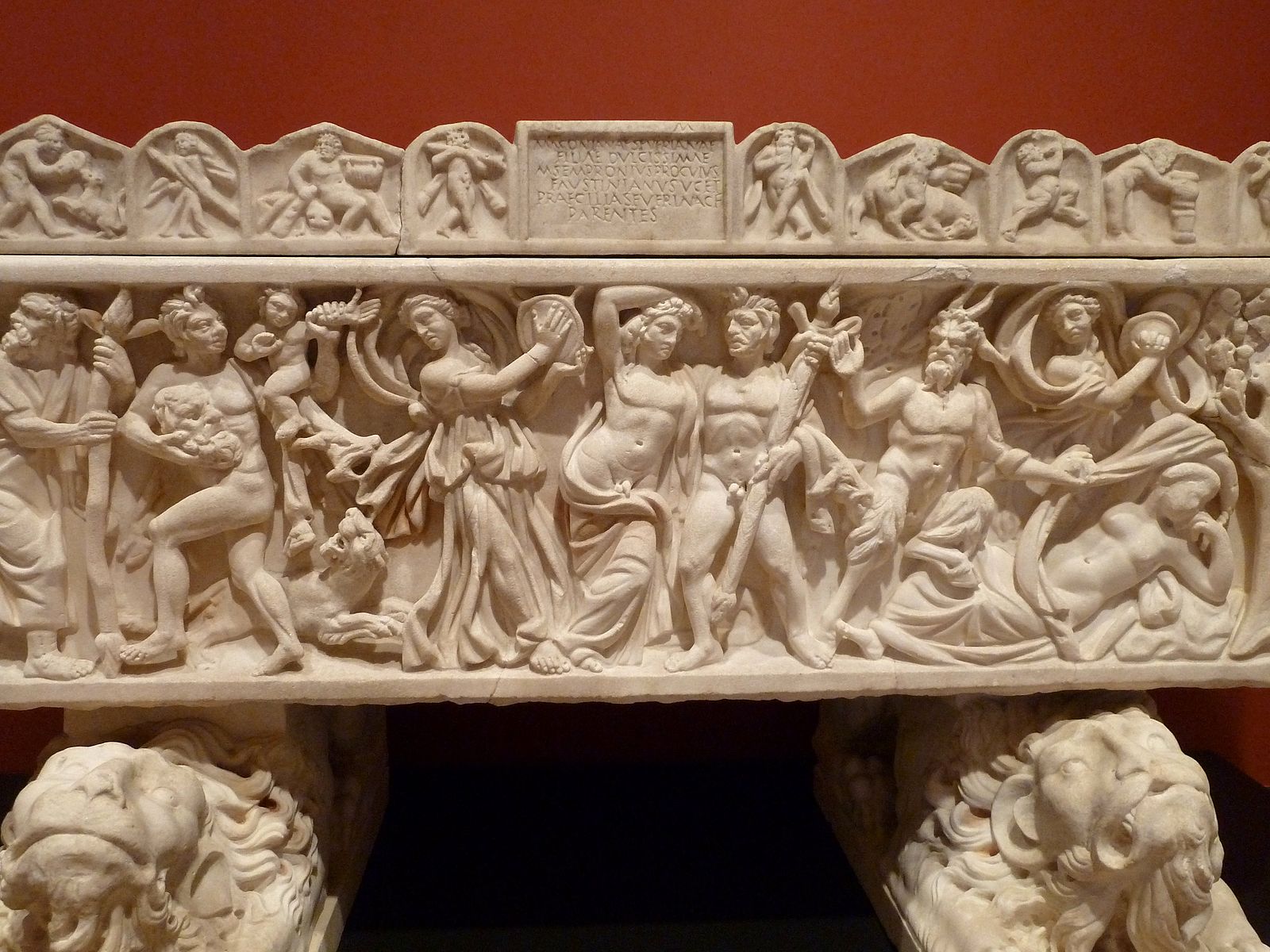
L: Dionysus (Attic kantharos, 520-500 BCE); R: Dionysus & Ariadne (sarcophagus, 210-220 CE)
- ancient mystery religions: secret rites of initiation, promise of personal salvation, rituals of rebirth, happy life & afterlife (e.g. Eleusinian Mysteries of Demeter); Greek Dionysus – freedom?
- religious context (186 BCE ): foreign cults of Isis, Magna Mater established (2nd Punic War), Bacchus in Italy – why suppression of Bacchanalia?
senate extending Rome's hegemony over "allies" in Italy (administrative control in "state of emergency")?
broad assertion of senatorial control/authority (esp. over religious cult)?
genuine fear of civil disorder?
women's power over (esp. young) men threatening traditional patriarchy (cf. 2nd Punic War, Casina)?
- Augustan Livy's (59 BCE-17 CE) conservative & hysterical account (sources unknown; reflects later Roman centralized rule over Italy)
Livy 39.8
The pleasures of drinking and feasting were also made part of the cult so that more people could be attracted to it. When drink had aroused passions, and darkness and the intermingling of males and females, older and younger, had eliminated all moral judgment, depravity of every kind first began to emerge, since they had laid on for them the gratification of that sexual desire to which they were by nature more inclined. Nor was promiscuous sex between freeborn men and women the only form of immorality. There was also perjured testimony in court, forged seals and wills, and manufactured evidence, all emanating from the same workshop; and from there, too, came cases of poisoning and murders within families, sometimes with the bodies not even coming to light to make burial possible. Many offenses involved swindles and most of them violence. The violence was hidden, however, because amid the fornication and bloodshed no outcry could be heard over the shouting and the beating of drums and cymbals.
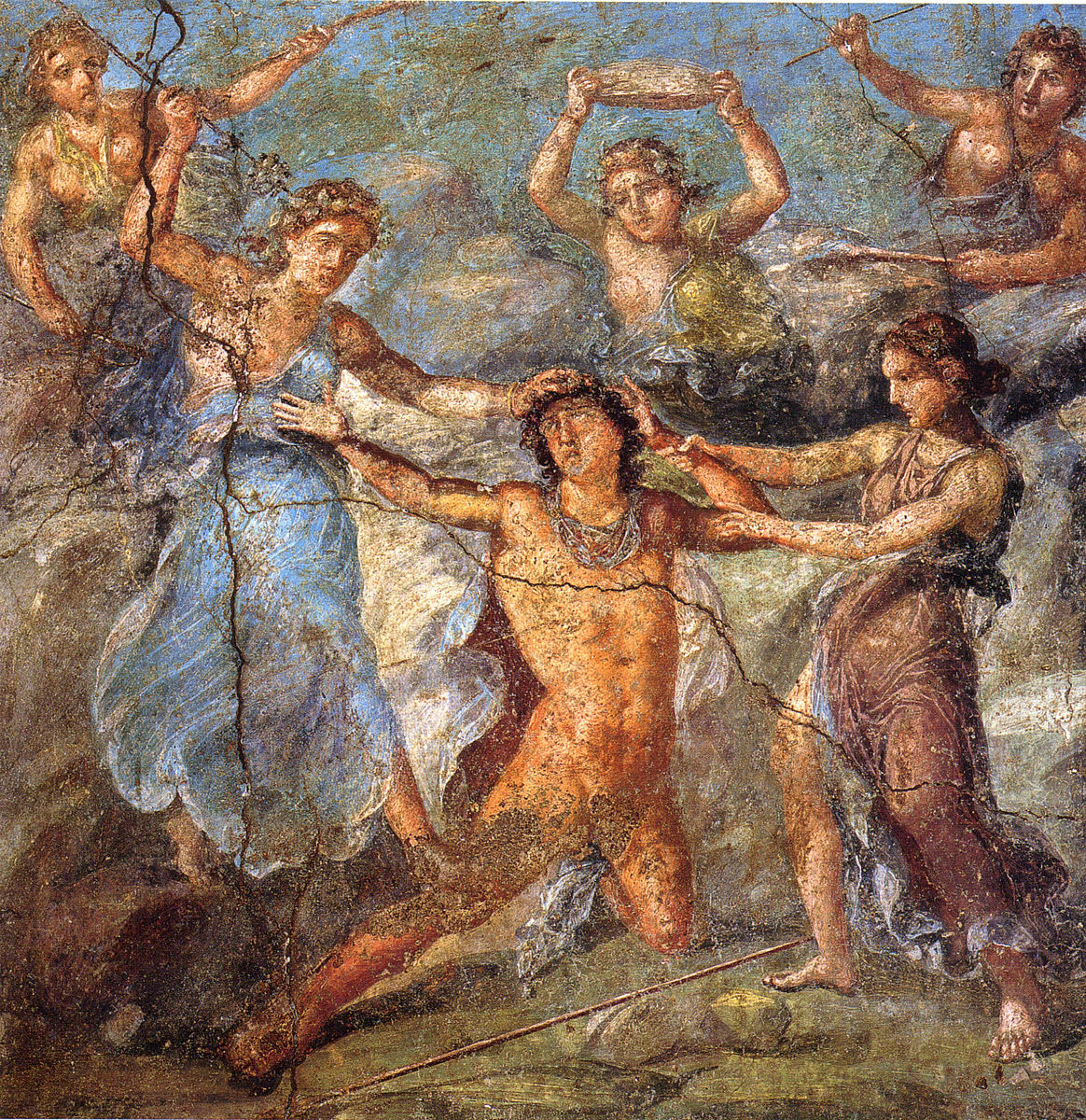
Pentheus & Maenads (Casa dei Vettii, Pompeii)
- Hispala: freedwoman/prostitute initiated as slave; invented (?) narrative – Aebutius & evil stepfather, Aunt Aebutia, Sulpicia (consul's mother-in-law) > cult's reform by Paculla Annia (priestess of Campania), sorting out good vs. bad women
Livy 39.9 ("a hooker with a heart of gold")
There was a well-known prostitute, a freedwoman called Hispala Faecenia. She deserved more than that occupation; she had taken it up as slave girl and had continued to keep herself by the same line of work even after her manumission. A sexual relationship with Aebutius arose from their being neighbors but this in no way damaged the young man’s finances or his good name: it was he who was the object of Hispala’s affections and he who had been sought out by her, and while his own family was niggardly in every respect toward him he was actually supported by the courtesan’s generosity. In fact, her affair with him had progressed to the point where, on her patron’s death, she, being under nobody’s legal authority, petitioned the tribunes and the praetor for a guardian, made a will and appointed Aebutius her sole heir.
Livy 39.19 (Hispala's rewards)
. . . that Faecenia Hispala have the right to convey her property or draw on it, to marry outside her gens, and to choose a guardian, just as if a husband had granted her that privilege in a will; that she be permitted to marry a freeborn man, and that whosoever married her suffer thereby no prejudice or loss of status; that current and future consuls and praetors see to it that the woman come to no harm and that she live in security.
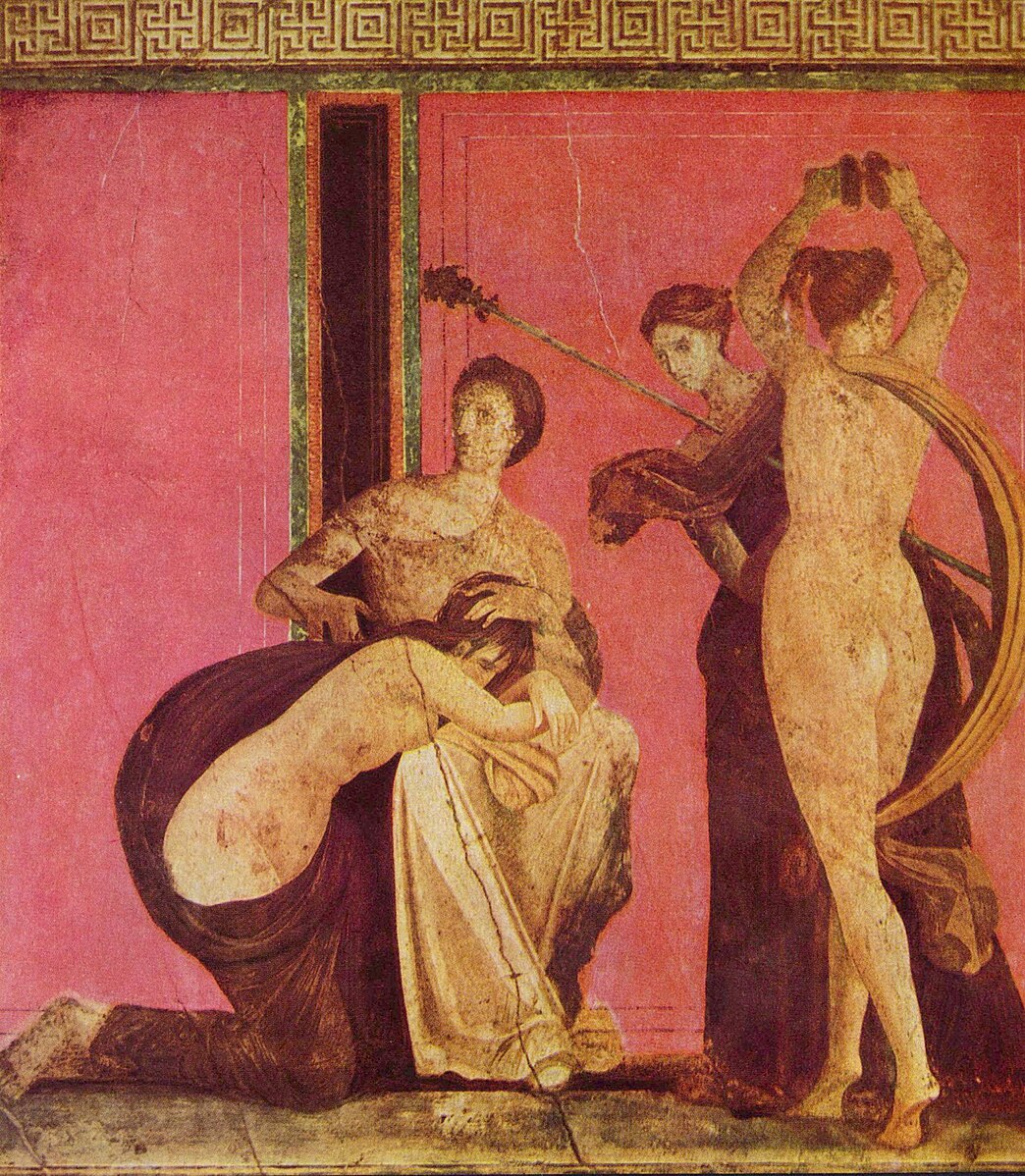
Bacchic rite (Villa of the Mysteries, Pompeii)
- Bacchus' mystery rites/orgia: nocturnal mixing of sexes, religious ecstacy, music, wine, spectacle
Livy 39.14
It was Paculla Annia, a priestess from Campania, who had made the radical changes, supposedly at the prompting of the gods. She was the first to have initiated males (her own sons, Minius and Herennius Cerrinius) and she had made it a nighttime as opposed to a daylight ceremony, with five days of rites per month instead of three in a year. Ever since the rites were integrated, with men mixed with women, and with darkness giving participants freedom of action, there was no crime and no shameful act omitted from them. There were more sexual assaults inflicted on the men by other men than on the women, continued Hispala, and any who showed reluctance to submit to abuse or hesitated to engage in crime became sacrificial victims. To consider nothing sinful—that, among them, was the essence of religion, she said. Men who appeared deranged would utter prophesies with a furious shaking of their bodies. Married women wearing the dress of Bacchants and with hair streaming would run down to the Tiber carrying blazing torches; they would plunge them in the water and draw them out again still aflame because of a mixture of pure sulfur and calcium contained in them. Some whom they tied to a crane and whisked out of sight into hidden caverns were said to have been “taken by the gods,” and they were those individuals who refused to join the conspiracy, be involved in crimes, or submit to sexual abuse. The number of participants was enormous, by now virtually amounting to a second city-population, and included certain men and women from the nobility. In the past two years, Hispala said, it had become established that no one above the age of twenty be initiated; the targeted age groups were those susceptible to corruption and sexual abuse.
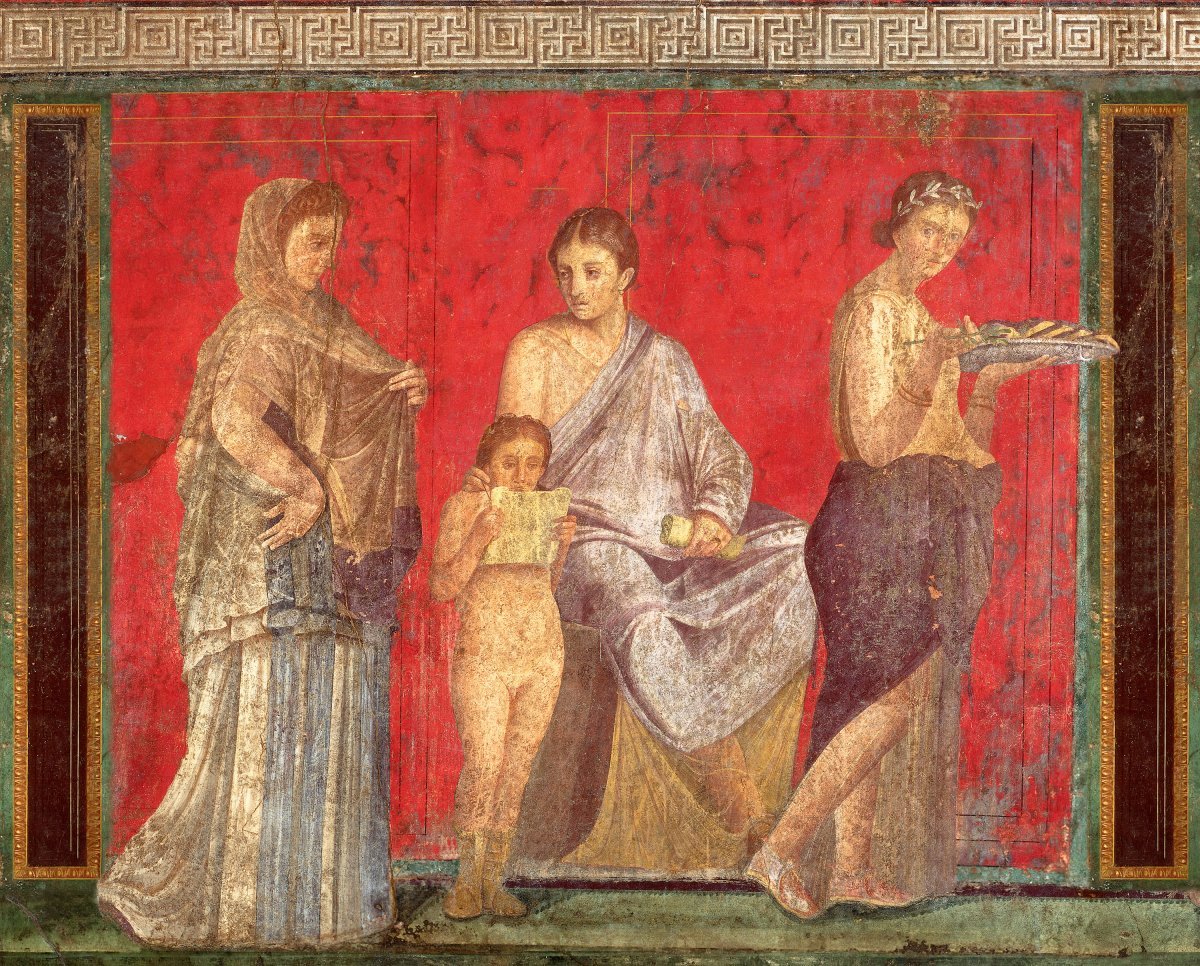
Bridal mystery rite (Villa of the Mysteries, Pompeii)
- consul's (Postumius) speech: the crackdown!
Livy 39.15-16
"First of all, then, most are women, and they were the source of this plague; then there are males just like women, who submit to and in turn inflict sexual abuse, frenzied characters in a stupor from lack of sleep, from drinking, and from the nightly hullaballoo and shouting. As yet the conspiracy has no strength, but it is gaining strength on an enormous scale because its members are becoming more numerous every day . . . It would not be so bad if by their immoral behavior they had merely been made effeminate—that would have been largely a matter of personal dishonor—and if they had kept their hands free of crime and their minds free of subversive activity. Never has such villainy existed in the state or touched so many people or so many aspects of society. You must realize that all the iniquity of the past few years—all the depravity, treachery and criminal behavior—has emanated from that one shrine. These people have not as yet brought off all the criminal acts they have conspired to commit; their unholy conspiracy, not yet having the strength to bring down the state, has so far been limited to crimes against individuals. The mischief is growing and infiltrating society each day—it is already too large for the resources of an individual to keep under control and it seeks to engulf the whole state."
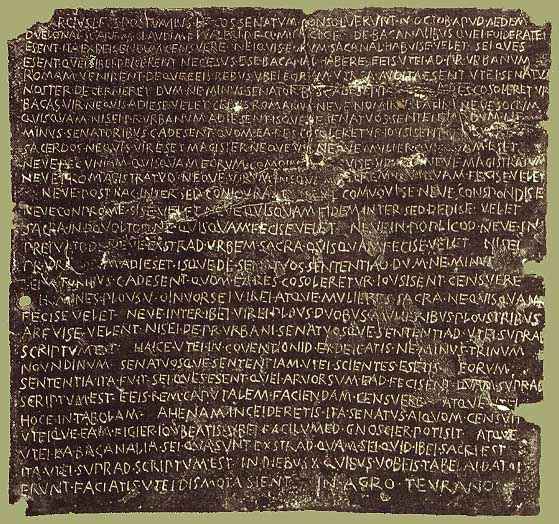
Reproduction of the Senatus Consultum de Bacchanalibus (bronze tablet, Tiriolo, 186 BCE)
- outcome: 7,000 involved (39.17-18) – prison, capital punishment, suicide (women handed over to male guardians)
Decree of the Senate on the Bacchanalia: instructions for eliminating cult (administration, freedom of assembly, venues), legal precision minus Livy's moral rhetoric
"No man shall be priest of, nor shall any man or woman be master of, such an organization; nor shall anyone of them have a common fund; nor shall anyone appoint any man or woman to be master of such an organization or to act as master . . ."
"No one shall perform their rites in secret; nor shall anyone perform their rites in public, in private, or outside the city, unless he has appeared before the urban praetor and he has given permission, in accordance with the opinion of the Senate, delivered while not less than 100 senators were present when the matter was discussed."
"No one in a company of more than five persons altogether, men and women, shall perform such rites; nor in that company shall more than two men or three women be present, unless it is in accordance with the opinion of the urban praetor and the Senate, as has been written above."
"If there are any persons who act contrary to what has been written above, it is our opinion that a proceeding for a capital offense must be made against them."
Instructions: ". . . and you shall inscribe this on a bronze tablet, for thus the Senate voted was proper; and you shall order it to be posted where it can be read most easily; and, as has been written above, you shall provide within ten days after these tablets have been delivered to you that those places devoted to the worship of Bacchus shall be dismantled, if there are any such, except in case something sacred is concerned in the matter."
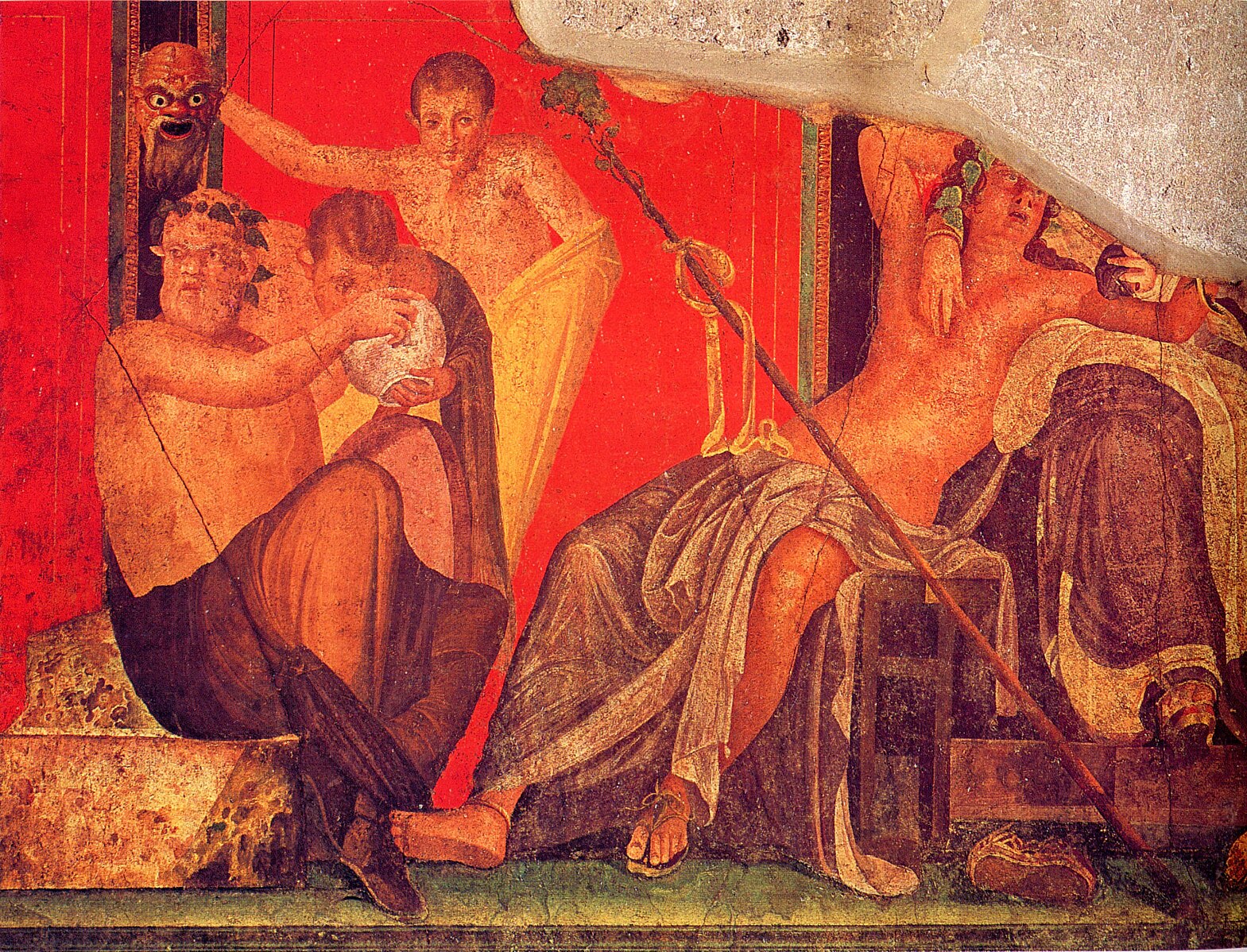
Dionysiac frieze (Villa of the Mysteries, Pompeii)
- Bacchus/Dionysus assimilated into cult of old fertility god Liber (Liberalia; cf. Roman triumphal procession)








